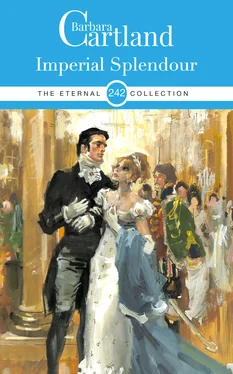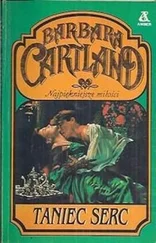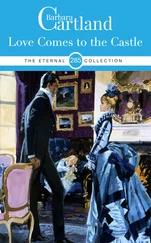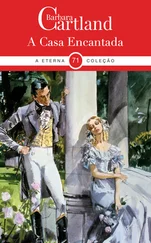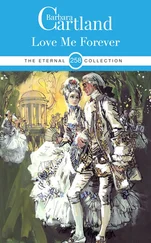The Duke glanced only perfunctorily at these magnificent works of art for his mind was still concerned with Bonaparte’s advance into Russia.
‘It would be a tragedy,’ he told himself, ‘if treasures such as I see here should be lost to posterity.’
When he reached the Czar’s apartments, he was saluted by the sentries of the Grenadiers of the Golden Guard.
Picked for their great height, out of all the Regiments who wore the Russian bearskins, they were the most gorgeous.
They wore white trousers and leggings, a black tunic with gold cuffs and collar and cutaway tails, gold-edged with red on which was fastened a cartridge case embossed with a double-headed eagle.
The Duke found the Czar waiting for him. Tall, fair-haired and externally handsome it was easy to understand that the Russian people had looked at Alexander on his accession like a Fairytale King come to save them from all their miseries.
Yet when, at twenty-four years of age, he had ridden to his Coronation in 1801, a wit in St. James’s had remarked,
“He was preceded by men who had murdered his grandfather, escorted by men who had murdered his father and followed by men who would not think twice about murdering him!”
The Duke had heard from one of the Czar’s closest friends that, when Alexander had learned of his father’s cruel death, he had burst into tears.
“I have not the strength to reign,” he had sobbed to his wife. “Let someone else take my place”
The Duke had begun to think that the vision of Paul’s strangled battered body haunted the Czar.
He was perceptive enough to know that Russians could suffer in their souls in a way that perhaps men of other nations are unable to do.
He had known the Czar for some years personally and he was aware that he was often mentally convulsed with an inner agony that would, he thought, become worse rather than better as he grew older.
As he might have expected, the Czar was this morning looking worried and speaking in a manner that had a touch of hysteria about it.
“The news is bad – very bad!” he told the Duke after he had greeted him.
“What have you learned, Sire?” the Duke enquired.
“That Bonaparte is still marching towards Moscow!”
The Czar spoke as if he could hardly bear to say the words and then he sighed,
“God knows if it is the truth. To be honest no one seems to know what is happening.”
The Duke was not astonished at this statement.
Methods of communication between the Army and the Czar were mostly haphazard and incompetent, as were a great many other things in Russia.
They sat down to breakfast at which, as was usual, there were three kinds of bread.
One was a roll of white bread called kalatch , as light as a feather and eaten hot, which was made from water brought especially from the River Moska.
This water was delivered to all the Palaces in St. Petersburg, a custom that dated from the previous century.
As they ate, the Czar, instead of talking about what was happening to the troops under Kutuzov’s direction, did nothing but quote passages from the Bible.
When the Duke looked at him in surprise, he explained,
“Yesterday I was told that my lifelong friend, Prince Alexander Golitzen, is a traitor.”
“That is impossible!” exclaimed the Duke, who knew the Prince quite well.
“I tried not to believe what I was told,” the Czar said in a low voice, “but my informant said that he is constructing an impressive new Palace where he could entertain Napoleon.”
“Surely you don’t believe such a wild tale?” the Duke asked.
“I went at once to visit Golitzen and asked him point-blank why he had chosen to build in such troubled times.”
“What was his reply?” the Duke asked.
“The Prince answered, ‘Your Imperial Majesty need not fear an invasion if you trust in Divine Providence’.”
The Duke raised his eyebrows, but made no comment and the Czar went on,
“Golitzen then reached up to a bookshelf to take down a heavy volume of the Bible. It slipped to the floor and fell open at the page on which is printed Psalm 41.”
The Czar paused impressively and the Duke said,
“I am afraid, Sire, I have forgotten that particular Psalm.”
“‘ I will say of the Lord, He is my refuge and fortress, my God, in Him will I trust ’,” the Czar quoted.
His voice had deepened and sounded impressive as he added,
“Golitzen convinced me that the opening of the Bible at this place was not a coincidence but a direct message from God.”
“I hope the Prince was right,” the Duke commented dryly.
“I am sure of it!” the Czar said. “All night I have been reading the Bible and meditating on God and our situation. I believe we will be saved.”
The Duke found it difficult not to remark that the Russians would certainly need the help of the Almighty as they could not hope to rely entirely on their Army.
Before he left England, he had seen a report by Dr. Clarke, an Englishman who had paid a visit the Tula arms factory only two years earlier in 1810 and he had been appalled by the incompetence he found there.
His report said,
“ The machinery is ill-constructed and worse preserved. Everything seemed out of order. Workmen with long beards stood staring at each other wondering what was to be done next, while their intendants or directors were either drunk or asleep. Notwithstanding all this, they pretended to issue thirteen hundred muskets a week from the manufactory !”
“What was the actual figure?” the Duke had asked.
“I have no idea,” was the answer, “but we have learnt that the Russian muskets, besides being clumsy and heavy, misfire five times out of ten and are liable to burst when they are discharged.”
The Duke had thought that French spies must have provided Napoleon Bonaparte with the same type of report as Dr. Clarke’s.
On invading Russia he was doubtless anticipating that the resistance he would encounter would not be very effective against his forces, highly organised and armed as they were with the latest most up to date equipment.
It would, however, have been pointless and merely unkind to repeat any of this to the Czar. So the Duke did his best to talk of other things, knowing that there was nothing to be gained by having ‘The Little Father’ of such a great country in such depths of despair.
‘Perhaps things will turn out better than I anticipate,’ he told himself optimistically.
But he found, when he moved amongst the Royal Family and other people staying in the Winter Palace, that they were as apprehensive as he was.
He also found the whole atmosphere so depressing that he decided to call on Princess Ysevolsov whom he had known for many years.
He had found when he arrived at The Winter Palace, a letter written in her usual animated and flowery manner, begging him to take the first opportunity he could find of renewing their friendship.
“ My poor husband is, of course, away on the Battlefield ,” she wrote, but I will receive you with open arms as one of my closest and dearest friends in England and I want too for you to meet my Little Tania. She was only ten or eleven when you last saw her. Now she is very beautiful and, when this tiresome War is over, I want to present her to our friends in London and have her make her curtsey to the Queen at Buckingham Palace. ”
The Duke had read the letter and found quite a lot of information written ‘between the lines’. He knew that Prince Ysevolsov was one of the richest men in Russia. His family, like other members of the Nobility for some generation’s past not only owned huge estates but a fantastic number of serfs.
Prince Ysevolsov, the Duke remembered, was supposed to own twenty-five thousand serfs in different Provinces of the country.
Читать дальше
